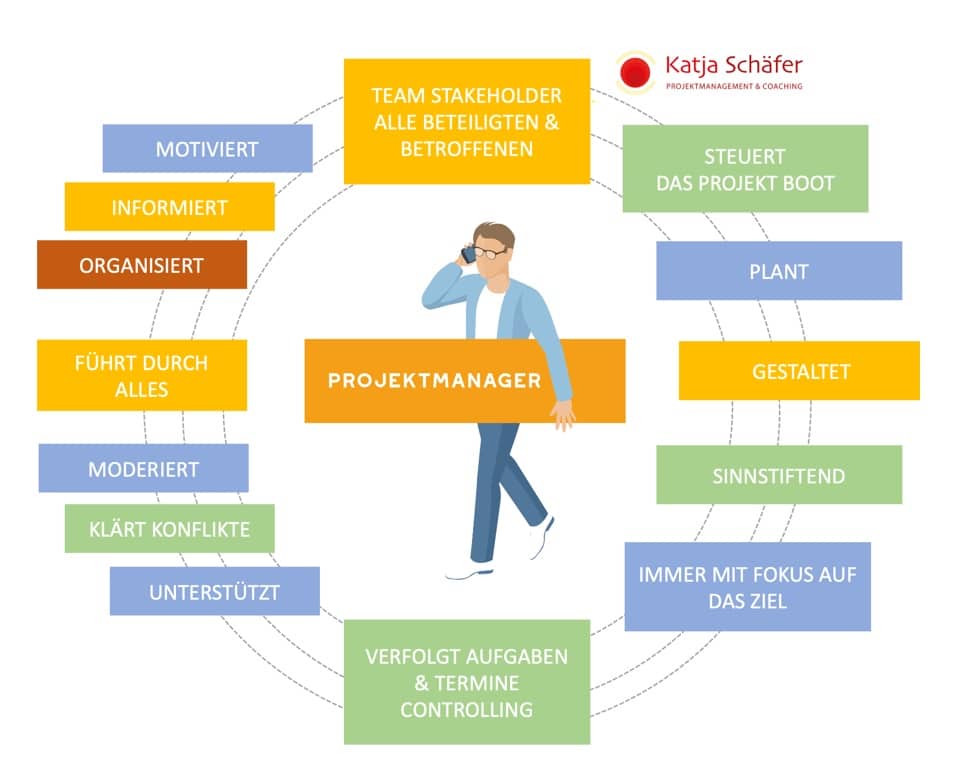Leadership and self-leadership in project management
Project leadership without self-leadership does not work!
What would it be like if every person who leads projects went through a school of self-leadership?
Maybe the word “school” creates a strange feeling in you? Maybe you are now thinking, “I don’t need that!”?
What you think and feel says something about yourself! If you stop for a moment and observe your reaction to my words, we are already in the middle of the topic of self-leadership.
School of self-leadership
What might this school of self-leadership look like, from which we emerge stronger to lead great projects and teams?
- A virtual place where learners come together and look into their own depth.
- A place where I take time for individual reflection and self-awareness.
- A place where I find guidance to go beyond my personal limits, to look more closely and to grow. There I become aware of my absolute self-responsibility and learn responsibility for all my feelings and thoughts. Building on this, I learn what self-control and proactivity really mean and what creative power lies within myself.
How long would this school have to last?
Self-direction is lifelong learning and a constant, personal process of developing and growing. It serves us to be more conscious in our thinking, feeling and acting. And very important: it is not a self-runner!
There are treasures within us that we can recover and that support us to lead better. Everyone who leads projects knows about the special nature of personal sensitivities and how this can affect the success of a project.
- Project managers know about resistance from stakeholders because the goal is not seen as achievable or the implementation is not seen as good.
- Overstrain in the team because the abundance of daily tasks cannot be managed.
Annoyance at colleagues who do not understand correctly or have not yet delivered the required results.
Is it about “being right” or about the solution?
Let’s look at meetings that are about “being right” instead of finding a solution. Meetings in which someone feels so attacked that no objective solution is possible. Or the resignation of the person who never feels heard.
All these personal sensitivities cost time and inhibit the success of the project and thus the achievement of goals. How do we deal with this?
It takes clarity in recognising, leadership and good, authentic communication!
Let’s make a mental switch to a person who has attended the school of self-leadership:
This person is recognisable by
- the strength of his/her creative power,
- the way he/she talks about his own mistakes and also his successes,
- the awareness and attentiveness with which he/she perceives his environment and the team,
- the clarity of his/her objectives and words,
- the esteem in which he/she treats other people,
- the joy with which he/she fulfils his task,
- the ability to communicate and last but not least
- his/her resilience!
Consequently, there are many good reasons to set out and devote more time and attention to self-leadership in order to lead projects better.
Leadership in the project
One of my sentences in seminars on project leadership is: “The project manager leads through everything in the project, but he does not do everything himself! Because those who do everything themselves instead of leading will quickly reach their limits in larger projects.”
Perhaps you know this from your own experience or have already observed such situations with one or the other manager. Very often, such behaviour comes to light when someone can take on a lot of technical tasks and this seems easier to him/her than teaching skills or transferring competencies; in short: leading the project and the project participants.
Let’s take a look at the variety of tasks of a project manager:
What a brilliant, versatile and demanding job, isn’t it?
Obviously, the sphere of influence and design of project managers is very large. Communicating with all relevant stakeholders, i.e. all those involved and affected, as well as the processes and areas that touch the project, managing the project with tasks and deadlines, always keeping an eye on the goal – it doesn’t get much more versatile than that. And here there is a second challenge to master when leading projects and project participants: micromanagement.
Micromanagement can often be observed in practice and is probably exactly the opposite of far-sighted and prudent project leadership. Micromanagement often undermines any sense of purpose that stakeholders associate with a project. Accordingly, motivation often suffers, conflicts arise and the goal of the project is lost from view.
How nice it would be if project managers combined their leadership and creative power with farsightedness!
Effects of self-leadership in project leadership
From the leadership of companies, people and teams, we know that leadership and self-leadership are inseparable. How do I want to lead something if I am not familiar with myself, if I cannot lead myself? It doesn’t work well!
If we set out to lead ourselves better every day and get to know ourselves more and more, this will have a very direct impact on our project leadership.
- How do I react under pressure?
- What space and framework do I need to find creative solutions?
- What words trigger me?
- What costs me strength?
- What strengthens my power?
- When does more and more work become unproductivity?
- What do I not dare to say?
- What do I avoid?
- What doubts and fears am I harbouring?
These are just a few examples to illustrate how comprehensive the field of self-leadership is and what treasures it holds for project and team leadership!
Self-leadership is natural mindset work and we can observe how our way of thinking changes step by step and we become a little better every day. What we have recognised and clarified in ourselves, we subsequently recognise very quickly and easily in others. We can then have a much better effect as a leader in the project:
In meetings we notice that we get to the point more quickly or that we are better able to pick up people and involve them.
We observe in ourselves how we express ourselves more clearly because we have become more aware of ourselves.
We can pick up others more easily, recognise what qualities we bring to the table and what qualities the other person has.
On the path of self-leadership, we will recognise many sides that amaze us, that we may even reject, and this makes us clearer and also milder as leaders!
Project leadership starts with myself!
Let’s imagine an IT project with a very ambitious goal. Together with the management, you present this project in the kick-off meeting. One or the other participant expresses that the timeline can hardly be kept, or that the team may not even have an idea of how the goal is to be achieved at all.
In project leadership, it is your job to bring everyone in the team along, give the project a good direction, connect the team and strengthen the goal! You will develop milestones and a procedure to be able to reach the goal together with the team. But no matter which project management methods you master and use, there will always be challenges in such a project:
- Dependencies that were not considered at the start.
- Parameters that change.
- Breakdowns in the team.
- Complexity that was underestimated.
How do you deal with them when you react out of pressure, stress, doubt and low empathy? And what would the same situation look like if you had practised clear project leadership and reflective self-leadership?
I invite you to reflect here. Do a little exercise and observe today:
- What strengthens your power and what weakens it?
- Observe your thinking and your feeling in encounters and meetings, in telephone calls and during the many tasks of the day.
- Also observe where you encounter hurdles, blockages, resistance, doubt, complexity, hurt, rejection – in others and in yourself.
Then extend the exercise to the next 21 days and observe the change by making a short note every day:
- This strengthens my power! And that weakens my strength!
If you know exactly what inspires you and also what perhaps hurts you or weakens your strength, you can lead projects and teams better. That’ s a promise.
Conclusion
Project management is a leadership task! If you only manage projects, deadlines, contracts, resources, you miss the most important part of project management: leadership!
Self-leadership is an important success factor for project management and a process of lifelong learning! We thus create more and more
- confidence and inner agility.
- resilience and adaptability.
- courage and clear communication.
I even dare to say that we are happier leaders and project managers when we set out and graduate from the school of self-leadership.
Notes:
Do a short PM check on the topic of self-leadership:
You can personally check the statements below. If you agree with three or more, then there is a need for action:
- Other people (team members, colleagues, clients) are not doing their jobs.
- The hamster wheel is my reality. Issues that I thought were already done keep coming back to me.
- Silently, I have already resigned myself to some issues.
- It seems almost impossible to keep track of the variety of topics and projects.
- I have lost the sense of what I am doing.
- I take on many topics myself and this compensation always brings me back into the time trap.
- I don’t have the time for a regular status, if I’m asked, I can’t get to the heart of the issues.
- My communication doesn’t really work well.
- Tasks are misunderstood.
- Personal sensitivities repeatedly lead to disruptions in the project.
- In everyday life I can often only react because urgent things keep coming up.
- Personal limits become noticeable due to a feeling of TOO MUCH.
- The abundance of topics and appointments causes great stress in me.
- I often sense from my reaction that it does not really fit the situation.
- I have doubts about the attainability of my own (project) goals.
If you like this article or want to discuss it, please feel free to share it with your network.
Katja Schäfer has published further articles in the t2informatik Blog, including

Katja Schaefer
Katja Schaefer is a consultant for complex large-scale healthcare IT projects in German-speaking countries. In her coaching sessions, seminars and training courses, she breaks new ground in project management and brings structure, clarity and success to large projects. She guides you through project crises with a wealth of experience and systemic work.



